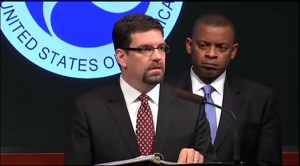
NHTSA Deputy Administrator David Friedman said the regional recall of vehicles with faulty Takata airbags is no longer enough.
Federal safety regulators called on Takata Corp. and the 10 automakers using the supplier’s faulty airbags, which have been attributed to four deaths in the U.S., to voluntarily expand the scope of the recall of the affected vehicles from a regional recall to a nationwide action … or else.
The National Highway Traffic Safety Administration (NHTSA) said the data shows that simply limiting the recall to just certain areas of the country is no longer a reasonable course of action.
“We now know that millions of vehicles must be recalled to address defective Takata air bags and our aggressive investigation is far from over,” said NHTSA Deputy Administrator David Friedman. “We’re pushing Takata and all affected manufacturers to issue the recall and to ensure the recalls capture the full scope of the problems.”
If the companies do not comply, the agency said it will “use the full extent of its statutory powers to ensure vehicles that use the same or similar air bag inflator are recalled.”
The current recall is for 7.8 million vehicles in certain part of the U.S. where humidity levels are high. Critics note that the movement of vehicles across the country and the variable nature of humidity invalidate a restricted recall.
After pressure from safety advocacy groups and the rumblings of Congressional leaders, it appears NHTSA is falling in line with this opinion. NHTSA contacted Takata and the vehicle manufacturers this week to call for the national recall of these vehicles after evaluating a recent incident that involved a failure in a driver’s side airbag inflator outside an area of high absolute humidity.
However, Takata remains steadfast that the regional effort is prudent.
“Takata is concerned that a national recall under these circumstances could potentially divert replacement air bags from where they’re needed, putting lives at risk,” the company said in a statement.
The supplier said it has evaluated 1,000 driver and passenger inflators from outside the humid areas and none have ruptured. The airbags, under certain conditions, will send metal and plastic shrapnel into the cabin of the vehicle. It’s been attributed to the aforementioned four fatalities and scores of other injuries. A fifth incident was reported outside of the “affected” area, which helped push NHTSA to act.
“This is a good move by NHTSA because it acknowledges the problem as a systemic design issue, not a climate issue,” said Karl Brauer, senior analyst, KBB.com. “While high humidity may accelerate the process it’s hard to believe there’s no risk in dry climates, especially with more than one Takata-related fatality occurring outside the previous recall zones.”
(Honda recalls 170K more cars with Takata airbags. For more, Click Here.)
Automakers have been mum on the subject for the most part, although Honda has been quietly fixing airbags on all of its vehicles involved in the recall regardless of the location.
(Click Here for details about Takata’s mounting losses related to its airbag recall.)
The agency ordered Takata and the 10 vehicle manufacturers using the inflators – BMW, Chrysler, Ford, General Motors, Honda, Mazda, Mitsubishi, Nissan, Subaru, and Toyota –to file, under oath, a detailed report and produce all related documents about completed, ongoing or planned testing of Takata inflators outside the current regional recall areas.
(To see more about Mazda’s new CX-3 City SUV, Click Here.)
Separately, it compelled Takata to release detailed information about the propellant used in its inflators. In recent days, Takata has publicly conceded that it changed the chemical mix of its air bag inflator propellant in newly designed inflators.
